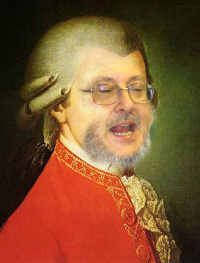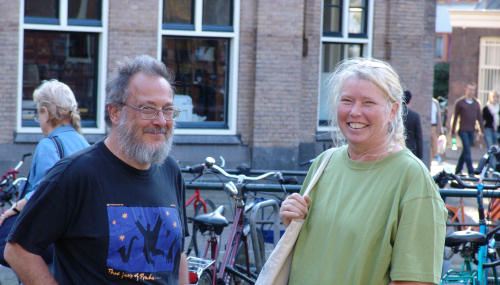A 365-Day Project
"We Are All Mozart"
A project to create
new works and change
the perception of the
music of our time.


 November 5, 2006
November 5, 2006 
This begins the sixth month of writing these commentaries, and it seemed only appropriate that last night I recorded the Montpelier Chamber Orchestra playing Beethoven's sixth symphony. Troy Peters conducted a program of the Pastorale, plus Gwyneth Walker's three-movement About Leaves and Joseph Canteloube's Songs of the Auvergne. All three were a strange trip back in time.
About Leaves reminded me of the music from high school, the Randall Thompson-y music that concentrates on its own surface. In listening to Thompson, I wonder what I have missed while being distracted by the loveliness of it. Canteloube's Songs of the Auvergne brought me back to college, where as a would-be French literature major, I spent two years learning historical French, version, accents and dialects, including the Languedoc dialect of Occitan, the language of Canteloube's songs.
But the most emotionally and intellectually confusing forty minutes was spent listening to that Beethoven Pastorale. This symphony was one of the earliest classical pieces that I encountered, and the very first recording that began my collection -- purchased exclusively for its cover. Over the subsequent fifty-some years I've listened to countless recordings and studied the music thoroughly in the worn miniature Heugel score obtained for a precious $1.50 at a New York music shop. It slipped from my interest a long time ago, but as the opening notes played last night, it was startling to realize that I had never before heard it performed in concert.
This recognition made me concentrate harder, and watch the motion, and listen inside the music to find what had mattered. It was the second movement, the Scene by the Brook. This set of suspended variations defies the sonata form in which it is written, and for me that is among its most compelling characteristics, along with the compound 12/8 meter and the hiding of motion inside the weak beats of weak beats, the gentle & unforced hemiolas that appear just twice, and the almost complete absence of defined cadential moments. Setting aside the programmatic name and the imitation bird-call coda, within the context of Beethoven's usual forward-driving compositional approach, the second movement does absolutely nothing for a quarter-hour. A miraculous defiance of convention, including his own, through musical subterfuge.
And to look at the score is to look at Philip Glass circa 1808.
* * *
Quick recommendation: On Sunday evenings, give a listen to the two-hour theremin program Spellbound at 10pm eastern time.
* * *
There's nothing like talking about élitism and passive amateurism to evoke response. A half-dozen readers commented about the disturbing character of nonpop artists, and tonight's commentary will be left largely to them. Composer Noah Creshevsky addressed the concept of the 'passive amateur':
|
Developments in technology have made it easy for passive amateurs to morph into active amateurs, not by learning to play instruments or even by singing in community choirs, but by tweaking a few buttons or icons representing buttons. It's important to distinguish between technical discriminators, common to academic elitists of various stripes, and the topic I am addressing. My concern is for the seductive ego-stroking that allows casual amateurs to come to the conclusion that the music they are hearing is actually "their" Bach rather than Bach's Bach. I've seen this perversion in action: An acquaintance whose home I visited asked if I would like to hear "his" Bach, and proceeded to play the Toccata and Fugue in D Minor with such excessive reverberation that it was nearly impossible to hear Bach's piece beneath the mass of smoggy distortion. The same host then asked if I would like to hear my most recent CD as "he saw it." This performance differed from the Bach, not only because Bach was dead and I was in the same room about to experience a fairly distasteful distortion of my work, but also because my host had known the Toccata and Fugue for many years, but had never taken the time to listen to my music as it had been released. One need not eat an entire cake to understand the nature of the product, and in this case the owner of some fairly primitive home equipment felt entitled to rework pieces of mine that he had not ever really heard in their original versions. |
This is significant, and I hadn't noticed it. Like Noah, a composer sent me a reworked version of a long electroacoustic piece which did little more than push it through several murky audio plug-ins, taking a layered acoustic transparency and turning it into a kind of acoustic gruel. This does not trouble me because it is mostly harmless, and it has a potentially positive side -- that the passive-become-active amateur may make discoveries and find the tools within to express those discoveries. Casals said (and I paraphrase from memory of a third-hand story) that he took more pleasure in the playing of amateurs than professionals because he could learn much more from the former, uninhibited as they were by knowledge or experience. The amateurs of Casals admittedly put forth more effort than accident, but in my unbearable optimism I can only hope that our generation of passive-become-active amateurs will either make those discoveries or learn enough to stop make their self-pleasuring a public display.
Noah goes on to agree with that from a slightly different perspective:
|
Having passed through a prolonged and very passive interlude, some consumers have devolved to casual and intrusive intervention and appropriation. One might build a case that any semi-musical activity (or semi-active activity) is preferable to absolute passivity, but I am disinclined to build that case at this moment. Perhaps it's a topic for another day, or for another proponent. |
That another day will come, no doubt. But Noah makes one more insightful comment that had eluded my considerations: the inherent confusion of invention with adjustment. Here is what he said in response to my comment that I had "made the case that we have a kind of allergy to participation, but that's an exaggeration as the proliferation of I-Reportism shows. The allergy is rather to committed participation, and the effect is a resentment of the committed participant.":
|
Just so, except the effect is also an easy move toward self-congratulatory exercises that allow uncommitted amateurs to confuse simple adjustments with genuine creative activity. It's a form of populism that underestimates the efforts of others while elevating some pretty basic "home improvements" to a level that's beyond their actual function. |
Noah treads upon the delightful grounds of élitism here, and I love it. He has in just two sentences made the case for why there are distinctions that validate the imagination, experience, technique, judgment, and application involved in the ab initio invention of art. Yesterday, while hanging the drapes that will keep us a little warmer in winter, I watched the 1988 film Camille Claudel. In 175 minutes, it said what Noah wrote in just fifty-one words. He wasn't making the distinction between professional and amateur here, but rather between, say, acoustic exploration and twiddling a tone control, or practicing dentistry and using a toothpick, or genetic decoding and growing a Chia Pet. (What Noah might have elided was the essential madness that awaits us all at the end of the creative journey.)
A friend from the beautiful Southwest wrote to add, "It seems like the rituals also allow the audience to stay apart from the art or music. The symphony and opera people here who wear formal attire seem to be so busy checking out each other they aren't even listening to the music -- and if you're worrying about when to applaud or who's cowboy hat is better, the same thing is true. That is the elitism to exclude outsiders while not really appreciating what is right in front of you." This is what could be called 'consequential élitism', the secondary level after the first-level rituals of separation have been surritualized and exhausted.
She goes on, "The audience experience is strange to me. It's sort of like a sports event. You can see much more from the comfort of your own chair and living room but being there is something indescribable." I've never been sure of this, but many folks have told me so. There is something exciting about an audience -- from inside or on stage -- but I've never felt the audience experience has contributed to my artistic experience, only my social awareness. One composer insisted that music was always a social experience, and lost all meaning without an audience, and was in fact directly proportional in value to the size of the audience -- and yes, he was talking about nonpop. The audience dynamic certainly affects some performances, and can electrify the experience ... but again for me, not the artistic experience. Indeed I am left conflicted about what I've heard inside the audience dynamic, and as a composer am often irritated at how little effort and involvement the audience offers in comparison to that contributed by the performers and the composers themselves.
This has already been discussed in the commentary about the ten audiences, but from the composer vantage point. Certainly being in the audience for the first time in forty-plus years of intimate internalized experience with the Beethoven Pastorale shifted my perspective ever so slightly -- but forever.

Shifting perspectives: Stevie and I a year ago in the Netherlands, a place we think of as our second home.